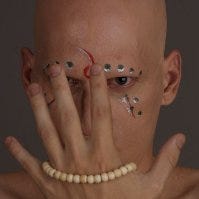
Featured Blog | This community-written post highlights the best of what the game industry has to offer. Read more like it on the Game Developer Blogs or learn how to Submit Your Own Blog Post
Approaches to Games as Art
An introduction to a series of articles I am writing about problems and techniques in approaching the medium of games from an artistic perspective.

This post is an introduction in a series I am writing on approaches to making games as art.
Games as art has been the focal point of many heated debates. You no doubt have your own opinion on the subject as I have mine. My views most closely align with this speech by Brian Moriarty. Games are NOT art BUT they most certainly can be, which is why I am writing this series of articles. I want to share my thoughts, challenges, and potential methods to overcome those obstacles I have encountered while attempting to make games as art. I would really like to one day experience a game that feels like art!
I have been very interested in this field since pre The Marriage and Passage time and have attempted many times to make games as art. All attempts were, in my opinion, complete failures. I have made art in other mediums. I have also had some art, including one game art, in a gallery. While I have studied art on my own, I do not have a formal art education. I am sharing from my own perspectives, ideas, and experiences. You can see a few pieces I've worked on at www.khepercrowbird.com/blog/.
What is art? What is an artist?
Instead of going with a shotgun definition, I am going to use a focus on one definition as a focal point. Art is a creation that captures the unknown. The unknown being an understanding of ourselves and our reality that we, as a collective, have yet to experience. It has also been called the mystery, God, the void, nothing, etc. This is preciously why art is so hard to quantify, art does not exist in a logical place. To capture a mystery one most become a mystery. As one definition of art arises it ceases to be an unknown and the definition must change.
An artist is then a person who creates with the focus to capture the unknown. I don't see an artist as something superior to those who create for craft or entertainment or education, rather I see them more as an explorer of the mystery whose primary goal for creating is discovery and their own personal development. I also think it is an incredibly unrewarding field as many artist will never actually create a work of art. This has given rise to the many creative-in-artist-clothing we see today. Most artist I have met are severely under-appreciated and are often unable to support themselves let alone their artwork. Art is a very difficult undertaking!
One thing I need to stress, there is nothing wrong with making games. Games do not need to be works of art to be culturally relevant or to be validated for their positive roles in the development of a person. When I read of people trying to force games to be considered art it makes me kind of sad because it shows people who are very insecure with the medium. A good game may actually be way better than a good art piece, this is okay. If you love games then make great games that show off the depth of the medium. Be careful not to make something that tries to be both great art and a great game, you are likely to accomplish neither. I love to work with the unknown, so I attempt to make art.
Destructing common mistakes when labeling art
I have read many arguments about why games ARE art. The following are the common misconceptions I encountered, given in order of my own progression on understanding art. If you disagree, instead of arguing, I highly recommend actually trying to make art in any medium. The best way to understand art is to try and make art.
Yes a game has visuals, audio, and writing; no this does not make a game art. While any of the pieces made to make something may be a work of art it does not automatically make the including medium art. This should be easy enough to understand.
Many very creative people work on games. This is very true. I have no doubt that many people in the game industry could be artist. But it is in the why the creator creates that makes them and their creation art.
I have played games that make me feel/think. Great! Games are getting better and better but art has nothing to do with making you feel or think. This was one of my biggest blocks to overcome in understanding art. While art, or a game, may make you feel/think it is not the purpose of art. Actually, purposefully trying to elicit emotions works against creating an art piece as you are focusing on an emotion versus the unknown.
Look at all the SYMBOLS! This is a super common art school mistake. While indirection and masking meaning is a very effective tool for an artist to use, it does not automatically make a creation art. However, symbols are quite fun.
What about this wave of self exposing games? While life, your own life especially, can be wonderful sources of creative inspiration, it does not mean you are making art. Much like symbols, life experiences are great tools, but they are just that, tools.
Can't everything we create be art? Yes! I do think it is entirely possible to make a game with the sole intent to create a game and still manage to make art. This has happened many many times in history (not with games). You don't have to be a treasure hunter to find treasure, in theory though, a treasure hunter should be way more likely to find treasure.
Now at this point you may be saying "What's left?". Well, not much. Remember you can't quantify nothing. Art is layers on the nothing that is everything and the everything that is nothing. All we have is our own intuition and feeling, tools such as experiences and symbols, and our medium.
Problems inherit to the medium
There are many good resources to better understand the artist intuition and tools. However, the biggest obstacle if you are trying to make games as art is the medium itself. To best be able to create art, the medium needs to be as transparent as possible. I hope to cover the following problems and potential solutions to overcome in future articles. If you have any more problem areas, please let me know so I can try to figure out solutions.
Games are games; Art is art: They are two inherently different mediums that don't always work well together. A game isn't a movie (well usually...). Fortunately art can be done in any medium but there are core elements of games that are particularly problematic for art creation.
Player Agency: Can a medium that looses authorial control, where the act of creation is shared, still be art? Working with player actions is a very difficult challenge. Personally, this is why I am most excited about this field, I LOVE interactive art.
Cultural acceptance between mediums: Even if you make a good work of art, how will it be received? Will the art world reject it? Will gamers even notice it? As artist we need to use tools like our aesthetics to help overcome this problem.
Accessibility: I'm just gonna say it. Games are horribly cumbersome. Even supposedly "casual" games require complex controls and lengthy learning processes. Art is generally a pretty inaccessible creation, but the difficulty should be in the content not the interface. This is a huge challenge.
Lack of texture: All non-digital medium have a textural quality about them. There is a brush in your hand, a canvas, strings on your instrument. Even a word has a texture about it, like balloon. I have found the lack of texture to inhibit creative expression. When I move a brush, a whim may catch me and I may change my motion. In that whim is the possibility for art to happen. Code and even game design has little freedom.
Complexity of development: A game has many parts and that each take a lot of time to develop. Maintaining the focus on art, which is hard to do even on quick art pieces, becomes more and more difficult with each layer of complexity.
Communication: Unless you are a maverick with many different fields or are working on something very small, you need to work with others. These others may not share your same artistic vision. Even if they do, there is going to be information and focus loss just from communicating your idea.
Ingrained logic: Programming, game design, and even graphical arts tend to be approached from a logical perspective. Logic is usually counter intuitive to grasping something that is illogical. How do you divorce logic from a medium that is inherently logical?
Lack of resources: If you are working on games as art, you are a pioneer, congratulations. Don't expect a wealth of experienced elders for advice. Fortunately the tools are a lot better than they were even 5 years ago! Unfortunately, these tools are optimized to support a typical video game, which may be completely useless to you. And don't even get me started on non-investment based funding...
Public displays: Art needs to live in the world to be appreciated. If you go digital, you will have to deal with draconian partners an over saturated marketplaces and trolls. If you go to a gallery, you have to think very differently than you currently do and face an audience that may not understand anything about games. Good luck!
Conclusion
Thank you for taking the time to read this introduction. If you have any feedback or encouragement, please share, I'm really not sure if there are others interested in exploring this field with me. If so, I will definitely write more!
Also, I can't stress how important it is to actually MAKE art if you want to be an artist. Any kind. Try, discover, and understand your own voice is crucial to being an artist. Practice, practice, practice!
Read more about:
Featured BlogsAbout the Author(s)
You May Also Like







.jpeg?width=700&auto=webp&quality=80&disable=upscale)








